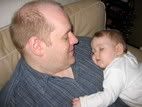Thanks to Wikipedia for the synopsis."
Samuel Vimes, Commander of the
City Watch of
Ankh-Morpork and Duke of Ankh, thought that things were bad enough when he was forced to go to Überwald—a largely wild territory—on a diplomatic mission. That was before he found himself entangled in a plot to spark the
dwarf equivalent of a holy war, not to mention running naked in the frozen wastelands of
Überwald with
werewolves on his trail.
The plot concerns the appointment of a new king of Dwarfs (the Low King). It is a controversial choice and the cause of a rift forming in the Dwarf community.
Lord Vetinari sends Vimes as the Duke of Ankh-Morpork to be an ambassador along with
Detritus and
Corporal Littlebottom - the idea being Trolls and Dwarfs are ethnic majorities in Überwald, where the Low King resides. Littlebottom is not a typical dwarf, as she accepts her gender and even wears a dress, which is highly offensive to the conservative dwarf society. Accompaining them as both guard and spy is
Inigo Skimmer, a scholarship boy from the Assassin's Guild school (the requirements for such a scholarship being left unsaid).
Once in Überwald Vimes finds his relationships with Dwarfs, Vampires and Werewolves very different from the ones he experiences back home and also finds the 'Scone of Stone' (a large piece of dwarf-bread the Low King MUST be crowned on, q.v.
Stone of Scone) has been stolen. Perhaps there is a link to the recent theft of a replica of the Scone in Ankh-Morpork, and the murder of a manufacturer of prophylactics in that city. Vimes must use his detective skills to solve the mystery of the Scone, while trying to stay alive.
A sub-plot involves
Carrot Ironfoundersson and
Gaspode the Wonder-dog going in search of Carrot's werewolf girlfriend
Angua. The simultaneous absence of both Vimes and Carrot from the city watch requires one of the existing watchmen to be promoted. Sergeant
Fred Colon is the senior officer, and so is made Acting Captain. Colon is not comfortable being a leader, and deals with the position very badly, becoming excessively strict and paranoid as the Watch crumbles around him.
The novel gives more detail on werewolf society, including the concept of yennorks, werewolves who cannot shapeshift, and are permanently in human or animal form. It also explores the society of dwarfs on the Disc, introducing the drudak'ak (which roughly translates as "they who do not get out in the fresh air much"), conservative dwarfs who are the keepers and interpreters of dwarf law.
This is the fifth Discworld novel starring Vimes and the City Watch. Also starring
Dwarfs,
Werewolves,
Vampires and Battle-Bread."
This is the 23rd Discworld novel and is actually one of my favourites. I like the development of dwarf culture, the expansion of the Igors and the Transylvania-esque setting. I particularly like the emphasis on Sam Vimes; I have a theory that he is being groomed for the patricianship....
As usual this is highly readable and very likeable. Having seen a few classic horror movies will aid picturing the surroundings, as will some knowledge of dwarf-culture from other fantasy sources (and some awareness of the bardic tradition in Welsh literature!).
One of the best Discworld novels so far, although not a good starting point.
Labels: discworld, terry pratchett

